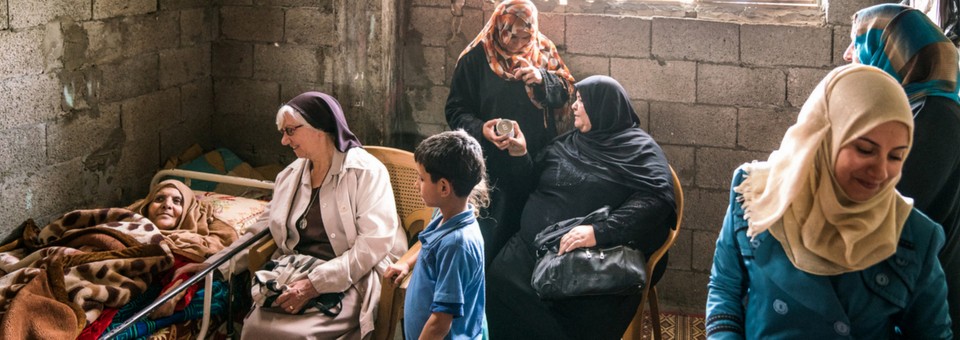GAZA – In light of the ongoing tragic events in the Gaza Strip, Caritas Jerusalem has been working with international and community based medical and humanitarian organizations to provide medical services and health care for the poor and the injured.
Caritas Jerusalem has been managing four mobile medical teams and emergency trauma clinics dispersed throughout the Gaza Strip, where they provide medical services and health care to patients who suffer from cancer, gunshot wounds and intestinal parasite infestation.
In collaboration with International Medical Corps, Médecins Sans Frontières and local community based organizations, Caritas Jerusalem treats wounded Palestinians who had been shot by Israeli forces during the protests of the “Grand March of Return” that started on March 31, 2018.
While visiting one the emergency trauma clinics near the Israeli fence, Sr. Bridget Tighe, General Director of Caritas Jerusalem, said in a report published by Caritas: “All the injured I met were young men with gunshot wounds to their legs. They will recover but thousands with serious injuries, including lower limb amputations, will be disabled for life.”
Last April, two Palestinian men lost their legs as Israeli authorities denied them an entry to receive medical care in a Ramallah hospital. Although they met the medical criterion for receiving a permit, the Israeli authorities said that “the main consideration for the refusal stems from the fact that their medical condition is a function of their participation in the disturbances,” referring to the Grand March of Return protests.
Water crisis in Gaza
Due to poor sewage treatment and contaminated water distribution centers, people in Gaza and especially children have fallen victim to intestinal parasite infections and diseases, which eventually could lead to malnutrition. According to the UN, along the shoreline of Gaza “some 110 million liters of raw or poorly treated sewage is flowing into the Mediterranean Sea every day”.
In the north of the Gaza Strip and Gaza City where intestinal infestation is very high, two of the four Caritas mobile medical teams administer deworming treatment and provide fortified biscuits to about 6000 refugee children, whose ages range from three to six years old.
“Some parents give the children fewer biscuits than recommended, spread them out over a longer period, and share them with their other children, all of whom are hungry,” said Ameen Sabbagh, administrator of Caritas Jerusalem in Gaza.
“They cannot get out of Gaza for treatment”
Cancer patients are also unable to leave the Gaza Strip to receive appropriate medical treatment. “They cannot get out of Gaza for treatment, said Sr. Bridget, and the only way to get chemotherapy and other cancer medication is to buy them in private pharmacies. These are expensive drugs that the poor cannot afford.”
According to the World Health Organization, five cancer patients died in August 2017 while waiting for security permissions to seek treatment outside of Gaza.
“One of the most distressing things I have to deal with is people coming to the clinic asking for help to buy cancer drugs not available in government centers,” Ameen told Sr. Bridget during her visit to Gaza last May.
“We need funds to buy emergency cancer drugs and analgesics for children and adults who ask for our help, as government stocks are totally depleted,” said Sr. Bridget. “We hope that international organizations will replenish essential supplies within a few months. Most of all we need prayers for those suffering that they will get food and medicine, and for peace and justice for all.”
Saher Kawas
Source: Latin Patriarchate of Jerusalem






